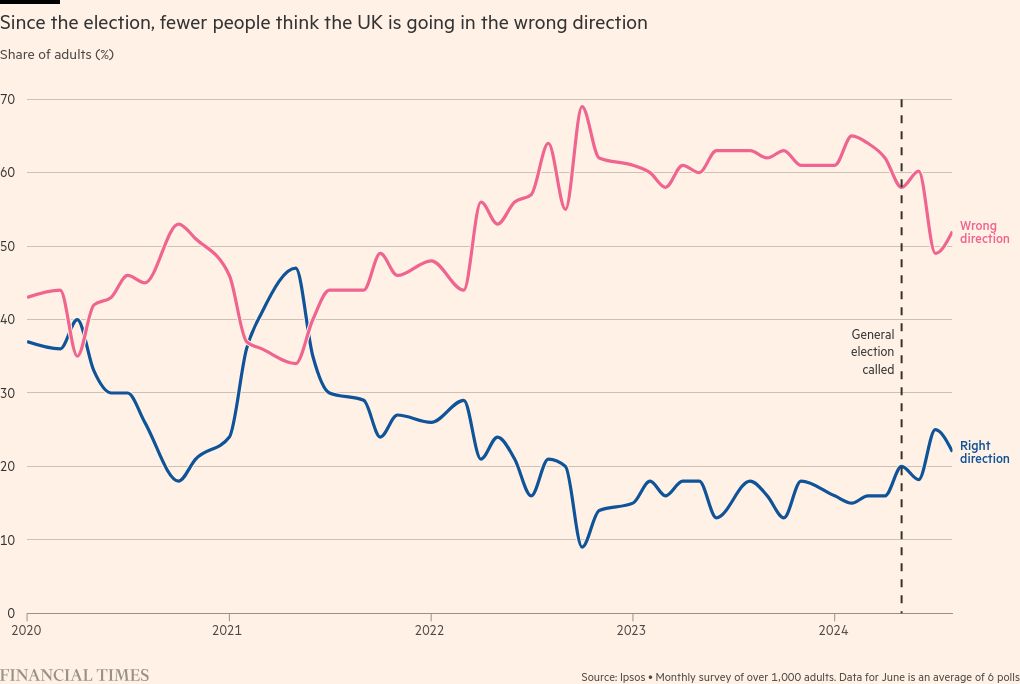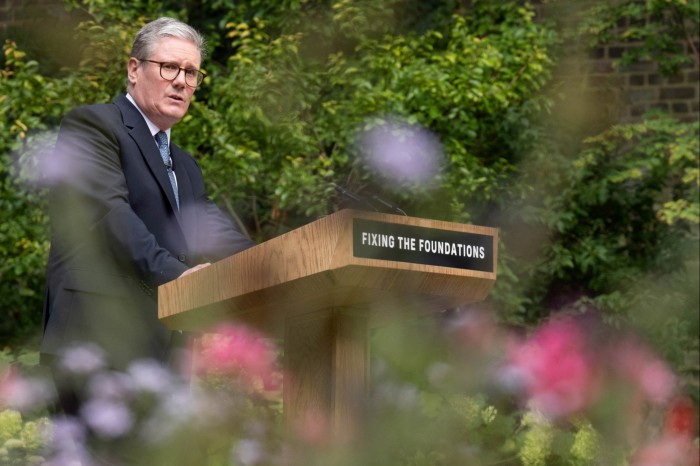
This article is an on-site version of our The State of Britain newsletter. Premium subscribers can sign up here to get the newsletter delivered every week. Standard subscribers can upgrade to Premium here, or explore all FT newsletters
Good afternoon. I hadn’t intended to write about the EU-UK reset this week, but then I found myself reading some internal EU documents on Brussels’s early negotiating red lines that spawned this front-page news report co-written with my colleague Andy Bounds.
The headline from that article — that the EU will not offer the new Labour government a deal to ease the plight of UK touring musicians in the bloc — points up some realities about the coming negotiations that have a relevance beyond the narrow issue of touring artists.
Most obviously, a deal on touring musicians was a Labour manifesto commitment. The EU knows this, yet is still not minded to budge, because changes to the UK’s satisfaction would require reopening the Trade and Cooperation Agreement.
The European Commission said the same thing to the Conservative government last March, arguing that fixing the musicians’ problems means carve-outs in areas like customs, cabotage (road haulage rules) and professional services that are foundational to the TCA.
So two takeaways: for all the warm diplomatic words (and there is warmth) the underlying message is that Labour won’t get materially different treatment than the Conservatives when it comes to structural nitty-gritty.
Secondly, Brussels remains of the view that the TCA is the primary vehicle of EU-UK relations and unstructured deviations from this are a slippery slope.
That’s not intended as an adversarial or political statement: it’s a function of the fact that Labour wants the same things — no free movement, no single market, no customs union — as their Tory predecessors.
As one EU official put it: “It’s not clear why we’d reopen the TCA when doing so would have much the same result.”
Self-limiting
That basic, self-limiting principle applies in other areas where Labour has expressed interest in improving EU-UK relations.
In an interview with the FT before the election, chancellor Rachel Reeves singled out reducing red tape for the UK chemical industry as an area where the UK could look for a deal to improve trade with the EU.
But as previously discussed, while some progress can be made via the TCA on reducing technical barriers to trade in chemicals and other areas, the UK cannot go deeper without being part of the EU single market.
That’s because, as the briefing documents note, there is no mechanism for countries outside the single market to access EU bodies like the chemicals agency, ECHA, in Helsinki. This in turn limits the data-sharing on which chemical regulation is based.
Even where there is an existing provision within the TCA — such as mutually recognising professional qualifications — progress will not be straightforward, as the Tories discovered when trying and failing to get a deal on architects before losing power.
And even as and when such deals are complete, their benefits are necessarily limited by the UK’s decision to remain outside the EU internal market which allows for the free movement of workers and professionals. And even if this intra-EU professional mobility is imperfect, it must be better than for third countries.
Picking targets
None of this is top secret intelligence. On the contrary, the Commission says it publicly over and over.
Which raises an interesting question: why has Labour picked targets for its EU-UK reset negotiation that it was clear in advance are both marginal in value and difficult to achieve?
The manifesto only has three actual commitments — an agreement on touring musicians, mutual recognition of professional qualifications and a veterinary deal for agrifood exports — and only the last of these is obviously achievable, albeit maybe at the price of accepting “dynamic alignment” with Brussels phytosanitary (SPS) rules.
Ironically, it’s quite possible that Labour plumped for a “musicians deal as an easier alternative to the idea of a full-blown youth mobility deal. This the leadership keeps rejecting (at least in the form envisaged by the EU) because it smacks too greatly of a return to free movement, even though it isn’t.
The result is that what many had hoped would be an early “win-win” confidence-building measure that respected both sides’ red lines — no free movement, not reopening the TCA — is now in danger of becoming a bone of contention.
Even if you don’t believe Labour’s leadership and think British objections to a youth mobility scheme are a negotiating ploy to build it up into a big EU “offensive interest” to be parlayed later for favours elsewhere, you’re also accepting that we’re heading for a traditional Brussels horse-trading contest.
On past performance, that probably isn’t good news. Optimists observe that the Commission can be flexible when it wants to be; and that Commission President Ursula von der Leyen is a pragmatist and sees the wider geopolitical picture.
They cite Brussels’s eventual movement over Northern Ireland with the Windsor framework; and its decision to extend the rules-of-origin clauses for electric vehicles, as proof of this.
But the EU had very obvious self-interest at stake in both cases — steadying Northern Irish politics and protecting its car industry from Chinese imports. It is less clear what the drivers of EU flexibility would be on many other files of interest to London, as noted above.
Getting off on the right foot
There are, of course, wider strategic arguments to be made on shared challenges on defence and security and reaching net zero, but the UK must ask itself how deep it is prepared to go to access these.
For now, Starmer’s red lines and cautious pronouncements on reversing Brexit already appear to answer that question in the eyes of the Brussels deep state: not very.
It is true we are in very early days. The mood music is genuinely harmonious. On the UK side, the cross-government discussion on strategy is only just beginning. A new Commission will not be formed until November. Real talks won’t begin much before next January. And at this stage, both sides are just setting out their stalls.
But that doesn’t change the basic parameters of the negotiation: the base metal of “no single market, no customs union” cannot be turned into gold.
Not for musicians, nor service providers nor — unless something changes — British defence companies looking for greater access to EU defence procurement programmes, something the Commission warns would erode the balance of “rights and obligations” in the TCA.
Of course, as EU officials observe, that balance might shift if the UK was prepared to put money in the pot, but that’s a hard-nosed calculation of interests. That’s something Brussels understands.
The risk now is that the new UK government — by talking loosely about improved “market access” on Starmer’s recent trip to Berlin and picking frankly odd targets like musicians and chemicals — gives the impression that its instincts are as woolly and cakeist as their predecessors.
That gives rise to an uncomfortable sense of déjà vu in Brussels just at the moment when it’s vital that both sides get off on the right foot.
Are you enjoying The State of Britain newsletter? Sign up here to get it delivered straight to your inbox every Thursday. Do tell us what you think; we love hearing from you: [email protected]
Britain in numbers

This week’s chart is taken from the rolling “political pulse” survey conducted each month by Ipsos, which asks the public if it thinks the country is broadly going in the “wrong direction” or the “right direction”.
It shows that after the election was called there was a noticeable uptick in those who felt it was moving in the “right direction” — an early shift that reflected, presumably, hopes for a change of government, which duly occurred.
The optimists were still in a minority, reflecting the pervasive mood of national doom and gloom after more than a decade of upheaval, but there appeared to be a little piece of political momentum on which the new Labour government might build.
But that was before Starmer’s speech in the Downing Street Rose Garden on August 27 where he talked, at length, about how the Tories had allowed a deep societal and political canker to take hold over Britain.

If the election had kindled a flicker of optimism in the British public, the new prime minister seemed oddly determined to snuff it out. And this YouGov poll showing the collapse of his own ratings suggests he may well have succeeded.
The speech wasn’t entirely without positives, but on the basis that journalists (just like the public) tend to seize upon the worst of everything, here’s what most people will have heard:
“deep rot in the heart . . . things are worse than we ever imagined . . . infected by a spiral of populism . . . a societal black hole . . . things will get worse before they get better . . . unpopular decisions . . . that’s what a government of service means . . . it’s going to be painful.”
Starmer is not a natural persuader, but even making allowances for this, the speech was ill-conceived. It managed to be both apocalyptic and bloodless: hair shirt Calvinism delivered in the unconvincing tones of an uptight Church of England vicar.
Does Starmer really think there is a “deep rot” in the heart of Britain? I’m just not convinced, and I doubt the public are either.
Subscribers to this newsletter will be more familiar than most with the deep structural challenges facing the UK, but as the saying goes: “a journey of a thousand miles begins with a single step.”
The political focus must be on making progress, however high the mountain is to climb, because leadership is, by definition, a forward-facing activity.
Winston Churchill, on inheriting an actual existential threat to the nation on becoming prime minister in May 1940, was quick to observe that recrimination over the past was both dispiriting and self-defeating.
As Britain steeled itself for the Battle of Britain, Churchill told MPs: “If we open a quarrel between the past and the present, we shall find that we have lost the future.”
If I was Starmer, I’d have that quote inscribed on the prime ministerial blotter.
I am away next week but my colleague Michael Peel, the FT’s science editor, will be on hand to give you a perspective from an area of policy that is absolutely central to the ambitions of this government.
The State of Britain is edited today by Darren Dodd. Premium subscribers can sign up here to have it delivered straight to their inbox every Thursday afternoon. Or you can take out a Premium subscription here. Read earlier editions of the newsletter here.
Recommended newsletters for you
Chris Giles on Central Banks — Your essential guide to money, interest rates, inflation and what central banks are thinking. Sign up here
Swamp Notes — Expert insight on the intersection of money and power in US politics. Sign up here